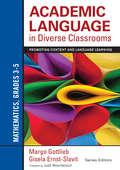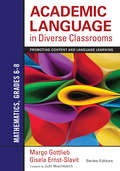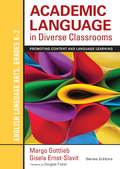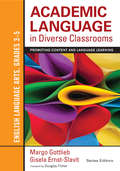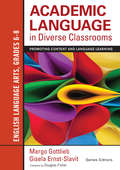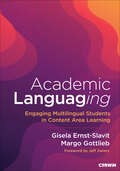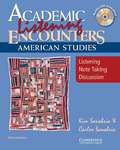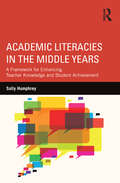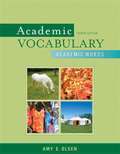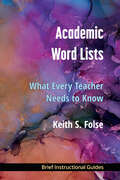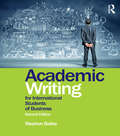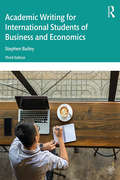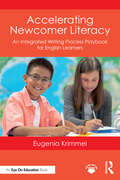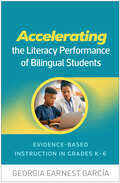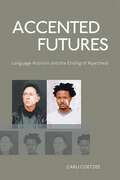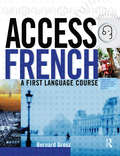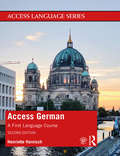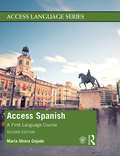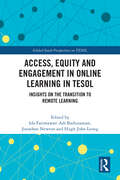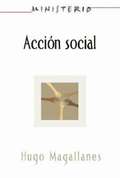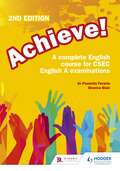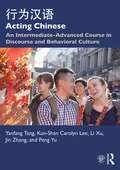- Table View
- List View
Academic Language in Diverse Classrooms: Promoting Content and Language Learning
by Dr Margo Gottlieb Gisela Ernst-SlavitMake every student fluent in the language of learning. The Common Core and ELD standards provide pathways to academic success through academic language. Using an integrated Curricular Framework, districts, schools and professional learning communities can: Design and implement thematic units for learning Draw from content and language standards to set targets for all students Examine standards-centered materials for academic language Collaborate in planning instruction and assessment within and across lessons Consider linguistic and cultural resources of the students Create differentiated content and language objectives Delve deeply into instructional strategies involving academic language Reflect on teaching and learning
Academic Language in Diverse Classrooms: Promoting Content and Language Learning
by Dr Margo Gottlieb Gisela Ernst-SlavitMake every student fluent in the language of learning. The Common Core and ELD standards provide pathways to academic success through academic language. Using an integrated Curricular Framework, districts, schools and professional learning communities can: Design and implement thematic units for learning Draw from content and language standards to set targets for all students Examine standards-centered materials for academic language Collaborate in planning instruction and assessment within and across lessons Consider linguistic and cultural resources of the students Create differentiated content and language objectives Delve deeply into instructional strategies involving academic language Reflect on teaching and learning
Academic Language in Diverse Classrooms: Promoting Content and Language Learning
by Dr Margo Gottlieb Gisela Ernst-SlavitMake every student fluent in the language of learning. The Common Core and ELD standards provide pathways to academic success through academic language. Using an integrated Curricular Framework, districts, schools and professional learning communities can: Design and implement thematic units for learning Draw from content and language standards to set targets for all students Examine standards-centered materials for academic language Collaborate in planning instruction and assessment within and across lessons Consider linguistic and cultural resources of the students Create differentiated content and language objectives Delve deeply into instructional strategies involving academic language Reflect on teaching and learning
Academic Language in Diverse Classrooms: Promoting Content and Language Learning
by Dr Margo Gottlieb Gisela Ernst-SlavitMake every student fluent in the language of learning. The Common Core and ELD standards provide pathways to academic success through academic language. Using an integrated Curricular Framework, districts, schools and professional learning communities can: Design and implement thematic units for learning Draw from content and language standards to set targets for all students Examine standards-centered materials for academic language Collaborate in planning instruction and assessment within and across lessons Consider linguistic and cultural resources of the students Create differentiated content and language objectives Delve deeply into instructional strategies involving academic language Reflect on teaching and learning
Academic Language in Diverse Classrooms: Promoting Content and Language Learning
by Dr Margo Gottlieb Gisela Ernst-SlavitMake every student fluent in the language of learning. The Common Core and ELD standards provide pathways to academic success through academic language. Using an integrated Curricular Framework, districts, schools and professional learning communities can: Design and implement thematic units for learning Draw from content and language standards to set targets for all students Examine standards-centered materials for academic language Collaborate in planning instruction and assessment within and across lessons Consider linguistic and cultural resources of the students Create differentiated content and language objectives Delve deeply into instructional strategies involving academic language Reflect on teaching and learning
Academic Languaging: Engaging Multilingual Students in Content Area Learning
by Gisela Ernst-Slavit Margo GottliebRethink how academic languaging can transform content area teaching For years, the teaching of content-based academic language to multilingual learners has focused on formulas, vocabulary lists, and sentence patterns—often sidelining students’ linguistic and cultural strengths. Gisela Ernst-Slavit and Margo Gottlieb address these challenges by embracing academic languaging, an active, collaborative student-driven process. Academic Languaging offers strategies to integrate language and content learning while fostering student engagement, voice, and agency. Dedicated chapters on academic languaging for Language Arts, Mathematics, Social Studies, and Science highlight the dimensions of disciplinary language for each subject and provide strategies for moving learning forward with multilingual learners. Additional features include: "Stop and Think" prompts to help educators connect new ideas with their instructional settings Prompts at the end of each chapter to encourage deeper thinking and application of the material Multilingual examples to mirror the varied classroom settings in the U.S. and beyond. The ultimate resource for educators committed to empowering multilingual learners and fostering meaningful, culturally sustaining education, Academic Languaging ensures multilingual learners comprehend academic content and thrive as confident, autonomous drivers of their own learning.
Academic Languaging: Engaging Multilingual Students in Content Area Learning
by Gisela Ernst-Slavit Margo GottliebRethink how academic languaging can transform content area teaching For years, the teaching of content-based academic language to multilingual learners has focused on formulas, vocabulary lists, and sentence patterns—often sidelining students’ linguistic and cultural strengths. Gisela Ernst-Slavit and Margo Gottlieb address these challenges by embracing academic languaging, an active, collaborative student-driven process. Academic Languaging offers strategies to integrate language and content learning while fostering student engagement, voice, and agency. Dedicated chapters on academic languaging for Language Arts, Mathematics, Social Studies, and Science highlight the dimensions of disciplinary language for each subject and provide strategies for moving learning forward with multilingual learners. Additional features include: "Stop and Think" prompts to help educators connect new ideas with their instructional settings Prompts at the end of each chapter to encourage deeper thinking and application of the material Multilingual examples to mirror the varied classroom settings in the U.S. and beyond. The ultimate resource for educators committed to empowering multilingual learners and fostering meaningful, culturally sustaining education, Academic Languaging ensures multilingual learners comprehend academic content and thrive as confident, autonomous drivers of their own learning.
Academic Listening Encounters: Listening, Note Taking, Discussion (Intermediate)
by Kim Sanabria Carlos SanabriaThis book engages students through interviews and academic lectures on stimulating topics from the field of American Studies. Topics include civil rights, traditional American values in relation to life today, country music, sports, and the globalization of American slang.
Academic Literacies in the Middle Years: A Framework for Enhancing Teacher Knowledge and Student Achievement
by Sally HumphreyThe professional learning framework this book presents is designed to support teachers’ understandings of how language functions in their academic disciplines. This framework—a 4 x 4 metalinguistic toolkit—is informed by systemic functional linguistic theory and international educational research on academic and disciplinary literacies. The book shows and explains how teachers have applied specific 4 x 4 toolkits with students in middle school classrooms across a range of subjects for curriculum literacy instruction, assessment and feedback, resulting in substantial growth for their students in high-stakes national tests of literacy, as well as writing assessments in a number of subjects. In its focus on disciplinary literacies in diverse sociocultural settings, Academic Literacies in the Middle Years responds to contemporary international curricula for English language and literacy and the need for a strong evidence base for professional learning design.
Academic Vocabulary, Academic Words (4th edition)
by Amy E. OlsenAcademic Vocabulary presents vocabulary building with a visually stimulating, full-color design to pique students' interest and make the process fun. This attractive, highly-interactive workbook improves academic word knowledge through academic readings and interactive exercises. Repetition of the words and getting the students to see the words used in multiple contexts improves memorization.
Academic Word Lists: What Every Teacher Needs to Know
by Keith S. FolseIn Academic Word Lists, Keith Folse explains how various lists like the Academic Word List (AWL) have become popular tools in the ESL classroom for teaching vocabulary. Following a discussion on the importance of teaching vocabulary, Folse explains why word lists are useful in language learning and how they can help address the lexical gap. He also outlines what words are on the AWL, how the word families are selected, and what teachers should know about other word lists. The book also includes 10 suggestions for using academic word lists in the classroom, including how to use vocabulary notebooks.
Academic Writing for International Students of Business
by Stephen BaileyInternational students of Business or Economics often need to write essays and reports for exams and coursework, and this new, second edition of Academic Writing for International Students of Business has been completely revised and updated to help them succeed with these tasks. This book explains the academic writing process from start to finish, and practises all the key writing skills in the context of Business Studies. The book can be used either with a teacher or for self-study, and is clearly organised into four parts, with each divided into short units that contain examples, explanations and exercises for use in the classroom or for self-study: The Writing Process, from assessing sources to proofreading Elements of Writing, practising skills such as making comparisons Vocabulary for Writing, dealing with areas such as nouns and adjectives, adverbs and verbs, synonyms, prefixes and prepositions, in an academic context Writing Models, illustrating case studies, reports, longer essays and other key genres This is an up-to-date book that reflects the interests and issues of contemporary Business Studies, with revised exercises, updated reading texts and a new glossary to ensure accessibility and maximise usability. Students wanting to expand their academic potential will find this practical and easy-to-use book an invaluable guide to writing in English for their degree courses, and it will also help students planning a career with international companies or organisations, where proficiency in written English is a key skill. All aspects of writing clearly explained, with full glossary for reference Full range of practice exercises, with answer key included Use of authentic academic texts Fully updated, with sections on finding electronic sources and evaluating internet material
Academic Writing for International Students of Business and Economics
by Stephen BaileyThe third edition of Academic Writing for International Students of Business and Economics is written to help international students succeed in writing essays, reports and other papers for their English-language academic courses. Thoroughly revised and updated to reflect issues such as diversity and sustainability, this book is designed to let students and teachers easily find the help they need, both in the classroom and for self-study. The book is divided into five parts, comprising a total of 42 units: The Writing Process Elements of Writing Language Issues Vocabulary for Writing Writing Models New topics in this edition include Writing in Groups, Written British and American English and Reflective Writing. In addition, the new interactive website has a full set of teaching notes as well as more challenging exercises, revision material and links to other sources. Additional features of the book include: Models provided for writing tasks such as case studies and literature reviews Use of authentic academic texts from a range of sources Designed for self-study as well as classroom use Useful at both undergraduate and postgraduate level A complete set of answers to the practice exercises Cross-references across all units Providing a glossary to explain technical terms and written to deal with the specific language issues faced by international students of Business and Economics, this practical, user-friendly book is an invaluable guide to academic writing in English.
Academic Writing for International Students of Business and Economics
by Stephen BaileyThe third edition of Academic Writing for International Students of Business and Economics is written to help international students succeed in writing essays, reports and other papers for their English-language academic courses. Thoroughly revised and updated to reflect issues such as diversity and sustainability, this book is designed to let students and teachers easily find the help they need, both in the classroom and for self-study.The book is divided into five parts, comprising a total of 42 units: The Writing Process Elements of Writing Language Issues Vocabulary for Writing Writing Models New topics in this edition include Writing in Groups, Written British and American English and Reflective Writing. In addition, the new interactive website has a full set of teaching notes as well as more challenging exercises, revision material and links to other sources. Additional features of the book include: Models provided for writing tasks such as case studies and literature reviews Use of authentic academic texts from a range of sources Designed for self-study as well as classroom use Useful at both undergraduate and postgraduate level A complete set of answers to the practice exercises Cross-references across all units Providing a glossary to explain technical terms and written to deal with the specific language issues faced by international students of Business and Economics, this practical, user-friendly book is an invaluable guide to academic writing in English.
Accelerating Newcomer Literacy: An Integrated Writing Process Playbook for English Learners
by Eugenia KrimmelThis book supports educators in teaching academic writing skills to Newcomer English Learners (ELs) who are just beginning their English language learning journey.Newcomer ELs typically have minimal familiarity with the English alphabet, which can be an obstacle for them learning writing, phonics, and spelling in English. Drawing on research and classroom‑tested methods, this book provides teachers practical strategies to help Newcomers start writing earlier, mastering letter-sound correspondence, and gaining confidence to write their thoughts in English. Readers will learn how to seamlessly integrate EL-targeted strategies and personalized literacy instruction into writing workshops to accelerate Newcomer’s acquisition of English phonics, spelling, and writing skills. These adaptable strategies also benefit World Language teachers seeking effective ways to teach writing and literacy to beginners on any language learning journey.Built on the author’s instructional coaching expertise and observations of field testing by practicing teachers, this is an excellent resource for English as a Second Language (ESL) educators and instructional coaches to promote faster and better literacy acquisition for their Newcomers and other beginner language learners.
Accelerating the Literacy Performance of Bilingual Students: Evidence-Based Instruction in Grades K-6
by Georgia Earnest GarcíaThis research-based, highly practical volume presents ways teachers and schools can accelerate literacy achievement with bilingual K–6 students in both English and their home languages. Georgia Earnest García shares innovative instructional strategies for students with different language backgrounds in multiple settings--bilingual/ESL classrooms, dual-language classrooms, or all-English classrooms. She explains key concepts, such as sheltered instruction and translanguaging, and discusses how the science of reading should be adapted for bilingual students. The book offers concrete ideas for conducting unbiased assessments and building core domains of L1 and L2 literacy, including oral language, reading, writing, and academic language and vocabulary. Utility is enhanced by guiding questions, helpful vignettes, and reproducible and downloadable forms.
Accented Futures: Language activism and the ending of apartheid
by Carli CoetzeeIn this wonderfully original, intensely personal yet deeply analytical work, Carli Coetzee argues that difference and disagreement can be forms of activism to bring about social change, inside and outside the teaching environment. Since it is not the student alone who needs to be transformed, she proposes a model of teaching that is insistent on the teacher’s scholarship as a tool for hearing the many voices and accents in the South African classroom. For Coetzee, ‘accentedness’ is a description for actively working towards the ending of apartheid by being aware of the legacies of the past, without attempting to empty out or gloss over the conflicts and violence that may exist under the surface. In the broad context of education, ‘accent’ can be an accent of speech; an attitude; a stance against being ‘understood’; yet a way of teaching that requires teacher and pupil to understand each other’s contexts. This is a book about the relationships created by the use of language to convey knowledge, particularly in translation. The ideas it presents are evocative, thought-provoking and challenging at times. Accented Futures makes a significant and important contribution to research on identity in post-apartheid South Africa as well as to the fields of education and translation studies.
Access French: A First Course For Adults (Access Language Series)
by Bernard Grosz Henriette HarnischAccess is the major new language series designed with the needs of today's generation of students firmly in mind. Whether learning for leisure or business purposes or working towards a curriculum qualification, Access French is specially designed for adults of all ages and gives students a thorough grounding in all the skills required to understand, speak, read and write contemporary French from scratch.The coursebook consists of 10 units covering different topic areas, each of which includes Language Focus panels explaining the structures covered and a comprehensive glossary. Learning tips and assessment checklists help students to achieve a sense of autonomy while at the end of each unit, a Découverte de la Francophonie section presents short texts of cultural interest. Numerous references to web-based activities, which will be an invaluable support to students' learning, add significantly to the course. The accompanying free Website gives direct access to additional internet-based activities for students, plus teacher support and guidance.
Access German: A First Language Course (Access Language Series)
by Henriette HarnischAccess German: A First Language Course provides a thorough grounding in all the skills required to understand, speak, read and write contemporary German from scratch based on everyday scenarios. This fully revised edition consists of 10 units, each of which includes language focus panels explaining the structures covered, cultural focus sections with current information from Germany and other German-speaking countries, and a comprehensive glossary. Learning tips and Ready to move on checklists help students to achieve a sense of autonomy, while the accompanying website gives direct access to additional listening, reading and speaking activities, plus teacher support and guidance. Access German is ideal for adult learners and students at level A1–A2 of the CEFR, and Novice–Low on the ACTFL proficiency scales.
Access Spanish: A First Language Course (Access Language Series)
by María Utrera CejudoAccess Spanish: A First Language Course provides a thorough grounding in all the skills required to understand, speak, read and write contemporary Spanish from scratch. This fully revised edition consists of 10 units, each of which includes Language Focus panels explaining the structures covered and Descubre el mundo hispano boxes providing cultural insight into the Spanish-speaking world. Learning Tips and Ready to Move On checklists help students to achieve a sense of autonomy, while the accompanying website gives direct access to additional listening, reading and speaking activities, plus teacher support and guidance. Updated audio tracks for this edition are also available online at www.routledge.com/9781138476684. Access Spanish is ideal for adult learners and students at level A1–A2 of the CEFR, and Novice Low on the ACTFL proficiency scales.
Access, Equity and Engagement in Online Learning in TESOL: Insights on the Transition to Remote Learning (Global South Perspectives on TESOL)
by Jonathan Newton Adi Badiozaman, Ida Fatimawati Hugh John LeongThis volume explores difficulties facing TESOL education’s transition to online learning in the Global South and Southeast Asia/Asia Pacific region, highlighting innovations of educators in engaging learners, thereby exploring the key themes of access, engagement, and equity in the field.Discussing themes such as academic burnout, cultural competence, and emotional regulation strategies in challenging educational contexts, this novel volume gives voice to field experiences encountered in countries such as Malaysia, Indonesia, Oman, Vietnam, China, and Iran. Chapters demonstrate how a lack of access to reliable internet connectivity and a shortage of digital devices, especially in rural areas, compound limited opportunities for students already facing educational inequalities, presenting the innovative and creative ways English educators are responding to these situations. Across interviews and qualitative studies, the book demonstrates that issues surrounding engagement with, access to, and equity within, the remote and online educational context are wider and longer lasting than the recent pandemic period itself and are at the forefront of challenges facing these regions today.Highlighting English educators’ resilience, perseverance, and creativity in challenging circumstances, the book will be of interest to researchers, scholars, and postgraduate students in open and distance education, eLearning, bilingualism/ESL, and distribution of technology in educational settings.
Accion Social: Social Action (Ministerio series) Spanish AETH
by Association for Hispanic Theological Education Hugo MagallanesAlgunas personas ven el trabajo social de la iglesia local como «el patito feo» de nuestra fe; como algo que se debe hacer pero que nadie quiere hacerlo. Aun más, hay quienes consideran que este tipo de ministerio no es necesario y que eltrabajo de ofrecer ayuda social le corresponde al gobierno y a otras agencias no gubernamentales pero nunca a la iglesia. Por estas razones, en este libro presento las bases y los fundamentos necesarios para responder a estas formas de pensar y tratar de cambiar la percepción de que el objetivo de la iglesia es solamente espiritual, sin ninguna implicación social. De la misma manera, espero que las sugerencias y métodos aquí presentados sean útiles para desarrollar ministerios de acción social que sirvan para aliviar las necesidades y sufrimientos de nuestro pueblo hispano y de la gente pobre y vulnerable que se encuentra en las comunidades a las cuales ministramos. Some people see the social work of the local church as “the ugly duckling” of our faith; something that should be done but no one stepping forward to do it. Others look to our state and local governments to handle this work. This book presents the basics to respond to these methods of thinking, and attempts to change the perception that the objective of the church is only spiritual, without any social responsibility. Suggestions and methods are presented to equip social action teams to assist with the needs and sufferings of the Hispanic community and the vulnerable and poor of our communities.
Achieve! A complete English course for CSEC English A examinations: 2nd Edition
by Paulette FerariaEnsure complete coverage of the new CSEC English syllabus with focused exam-practice and SBA guidance.- Test understanding with Paper 2 practice focusing on summary writing skills, expository writing, narrative discourse and persuasive discourse, plus practice Paper 1 items throughout.- Help students prepare for SBA with annotated examples and rubrics.- Develop comprehension skills with a genre-based approach.- Support students of all abilities with an in incremental approach that builds writing skills through practice exercises.
Achieve! A complete English course for CSEC English A examinations: 2nd Edition
by Paulette FerariaEnsure complete coverage of the new CSEC English syllabus with focused exam-practice and SBA guidance.- Test understanding with Paper 2 practice focusing on summary writing skills, expository writing, narrative discourse and persuasive discourse, plus practice Paper 1 items throughout.- Help students prepare for SBA with annotated examples and rubrics.- Develop comprehension skills with a genre-based approach.- Support students of all abilities with an in incremental approach that builds writing skills through practice exercises.
Acting Chinese: An Intermediate-Advanced Course in Discourse and Behavioral Culture 行为汉语
by Jin Zhang Li Xu Peng Yu Yanfang Tang Kunshan Carolyn LeeActing Chinese is a year-long course that, together with the companion website, integrates language learning with the acquisition of cultural knowledge, and treats culture as an integral part of human behavior and communication. Using modern day examples of Chinese discourse and behavioral culture, it trains students to perform in culturally appropriate fashion, whilst developing a systematic awareness and knowledge about Chinese philosophy, values and belief systems that will prepare them for further advanced study of Chinese language and culture. Each lesson contains simulated real-life communication scenarios that aim to provide a concrete opportunity to see how native speakers generally communicate or behave in social situations. An essential guide for intermediate to advanced level second language learners, Acting Chinese provides a unique and modern approach to the acquisition of both cultural knowledge and language proficiency.
